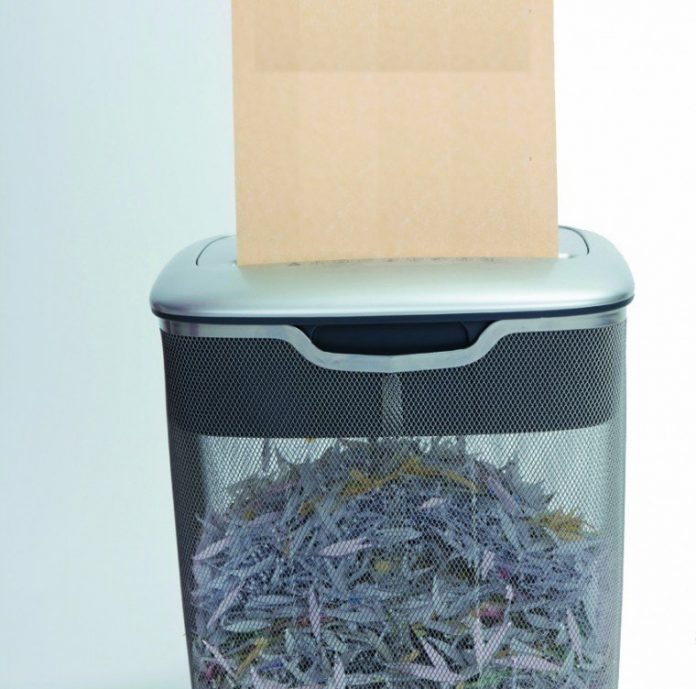Claudia Buck • McClatchy
ed****@****ic.com
Amid all the fears over identity theft, the No. 1 tip on how to avoid getting hit is always the same: Shred it.
“One of the best ways to protect your personal information from an ID thief is to shred important documents before you toss them,” said Noreen Perrotta, personal finance editor for Consumer Reports magazine.
That message was repeated often last month during National Protect Your Identity week. Joanne McNabb, chief of the state Office of Privacy Protection, routinely urges consumers to use a “cross-cut” shredder that slices paper both vertically and horizontally.
Don’t use a shredder that only slices paper into long strips. According to McNabb’s office, identity thieves have been known to painstakingly piece those strips back together to steal financial information.
But which shredder is best? To find out, Consumer Reports recently put 19 cross-cut shredders through its renowned testing lab. After feeding 25,000 pieces of paper through 19 machines, they rated and compiled their favorites.
“We hadn’t tested paper shredders in more than five years, but we were getting a lot of requests from consumers,” said Perrotta. (And yes, the 25,000 sheets were recycled, left over from an earlier test of computer printers. “Our testers were very happy to do something useful with all that leftover paper,” said Perrotta.)
The shredders were tested according to their claims. “If they claimed you could feed staples into it, we fed staples,” she said. Same with those that advertised they could shred plastic credit cards and compact discs.
In every case, they lived up to their billing, but some performed better than others. Some were faster. Some shredded paper into tinier pieces. Some could handle more volume at a time.
The four recommended models (from Black&Decker, Go EcoLife and two from Staples) were also among the most expensive, costing between $150 and $270. They each have specialized features – like super-sharp blades that can cut through plastic credit cards and CDs, or pullout bins to empty shredded paper, or the ability to let you load up 100 sheets of paper and walk away while they’re chewed into bits.
In her own home, Perrotta said she has a far less costly model that sits on top of a wastebasket and does an admirable job.
(The complete results, which appear in Consumer Reports’ December issue that’s now on newsstands, can also be found online at: consumerreports.org)
Perrotta says a lot of folks report their shredders “burn out.” Her advice: Read the manual and use a shredder the way it’s meant to be used.
Burning up a shredder could be caused by trying to feed too many sheets of paper through at once. Or putting plastic gift or credit cards in a shredder that’s not equipped to chew through plastic. And sometimes those clear windows on bills and bank statements could be the culprit.
“Our testers said if they put in unopened envelopes with the glassine windows, the shredders tended to jam,” said Perrotta. “It could have been the windows or that the envelopes are too bulky.”
For a complete list of what to shred, see accompanying box on the front page.
Another option: a mobile shredding service that sends a truck to your home or business and shreds paper while you wait. Typically, the mobile trucks have internal cameras that show the paper as it’s being shredded.
These “document destruction” companies are particularly helpful if you routinely have a large volume of paper, such as a small business or medical office.
They’re also useful if you’re “purging” paper and sifting through piles of paper and years of family tax returns and other documents.
In California, if your business handles documents containing phone numbers, driver’s licenses, bank accounts, insurance data or other personal financial information, state law requires that the paperwork be destroyed or otherwise rendered “unreadable” or “undecipherable.” About 15 other states have similar laws.
To find a reputable company, check if it’s a member of the National Association for Information Destruction Inc., a trade association whose North American members adhere to certain guidelines. It’s at www.naidonline.org.
Generally, companies like Absolute Secured Shredding Inc. or American Mobile Shredding Inc. charge either by the boxload or by weight. Prices range from $50 to $65 and up.
Sue Clouse, manager of American Mobile Shredding in Sacramento, says her company’s minimum price to have a mobile shredding truck at your door is $150, which covers up to 500 pounds of paper. That’s about 20 file-size boxes.
How long does it take to chew up that much paper? “About 10 minutes,” said Clouse, who said residential customers typically have bags of tax returns, checkbooks, old bills, etc.
Check with the Better Business Bureau to see if complaints have been issued against the company. And ask if it’s bonded and does employee background checks. Another option is looking for community shredding events, which are often offered by banks, credit unions and nonprofit groups. They often are free or ask for a minimal donation for up to five or six boxes.
“A lot of what happens with ID theft is out of our control,” said Perrotta, like data breaches where a company’s computer files are hacked. “But this is something you can control. Shredding cuts that risk of someone trying to go through your trash and steal your documents.”














